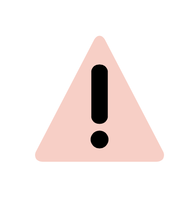Warning Signs/SYMPTOMS ⚠︎︎
Signs and symptoms of OCD can be different for every person. Below are some potential signs:
- Fear of germs and contamination
- Feeling like you have to do something a certain amount of times or something bad will happen
- Having things always in a symmetrical order
- Repeatedly checking on things
- Compulsive counting
- Fear of losing or not having things you might need
- Counting or tapping to reduce anxiety and stress
- Accumulating large amounts of unnecessary items (i.e: newspapers or empty food containers)
- Superstitions: Excessive attention to see why something is lucky or unlucky.
Risk Factors
Some may be at higher risk of having OCD if they have experienced any of the following:
- Genetics - Passed down from parent to child.
- Environment - Childhood trauma
- Stress: Major life changes (such as divorce, the loss of a loved one, problems in school/work, abuse).
- Pregnancy: OCD symptoms may worsen right after a pregnancy due to the fluctuation in hormones.
How to Help
- If you are know someone with OCD
- Encourage them to talk about their disorder. Don't be pushy. Learn about how it affects them, and be more supportive. Let them know that this isn't something they should be ashamed of!
- Acknowledge improvements! No matter how small, it is important to remind the person the goal they are working towards, and how far they have already come.
- Remember to be patient: It's important that they know their illness isn't a burden on you. This helps them open up and reassures them you will be there for support.
- If you are have with OCD:
- Try a method called "Fear Ladder" Make a "ladder" of steps and don't move on to the next step until you feel comfortable doing it. For example, the first step could be to put the juice in the fridge without checking to see if the top is secure. After you feel comfortable doing that, move onto the next step which could be to leave the house and lock the door without coming back to check it.
- Write down your thoughts: This method can help to show you exactly how repetitive your thoughts can be. This may help and give you a new perspective.
- Create an OCD worry period: Dedicate 10-20 minutes for your negative urges and DON'T try to correct them. At the end of the period, take a deep breath and return back to your normal activities.
- Join a support group & seek professional help.
Help Resources
- Help Guide - OCD: CLICK HERE
- International OCD Foundation: CLICK HERE
- Kati Morton - OCD: CLICK HERE
- How to recognize OCD: CLICK HERE
- Helping someone with OCD: CLICK HERE
- National Alliance on Mental Illness: 1-800-950-6264
- CDC Division of Mental Health: 1-800-CDC-INFO (1-800-232-4636)
More about OCD
- What is OCD: apa.org
- World Health Organization: who.it
- National Institute of Mental Health: nimh.nih.gov
- Centers for Disease Control and Prevention: cdc.gov
Proudly powered by Weebly


